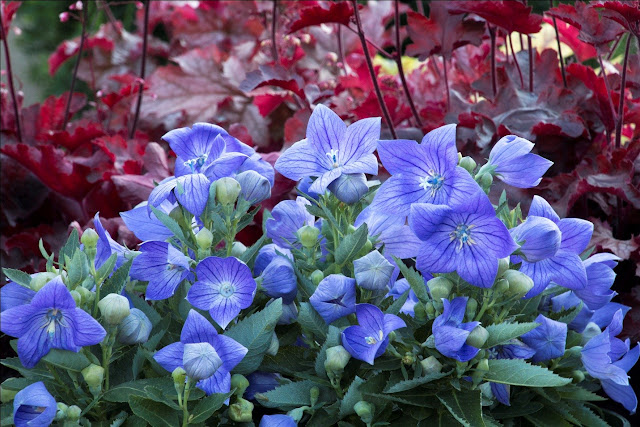Balloon Flower
Despite the
fact that inflatable blossom, Platycodon grandiflorus, is normally developed
for its unusual bloom buds, this plant is one extreme treat. Swell bloom is in
the simple developing Campanula family and you will see the likeness
immediately.
The natural
name signifies "expansive ringer", however the open blossom is truly
to a greater degree a star shape. However it's the puffy bud that interests
plant specialists and tempts them to develop this plant and that gives it its
normal name of "Inflatable Flower".
These are
seemingly perpetual perennials that once in a while require separating and are
dear safe.
- · Leaves: Alternate brilliant green leaves develop along the stems. This is a cluster framing plant.
- Flowers: The blossom bud swells up into a puff and gradually opens, going through a chime shape to a cleared back star with five petals, joined at the base. The purple-blue assortments are the most ordinarily developed, yet it likewise comes in white and shades of pink.
Growing Balloon
Flowers
The inflatable
plant is anything but difficult to develop and strong in USDA Zones 3-8. It
will flourish in sun or halfway shade. It enjoys all around depleted, somewhat
acidic soil; and despite the inflatable bloom plant will endure dry conditions,
it lean towards (and needs) a lot of dampness. This frosty solid plant likewise
lean towards cooler conditions in summer, so evening shade is a smart thought
for hotter locales.
Seeds can
straightforwardly sow in the garden or began inside in early spring. It is not
important to cover seeds; essentially saturate the range and inside a long time
you ought to have grows. Thin these to about a foot separated. For the most
part, inflatable blossoms sprout inside a similar season they are sown.
Caring for a
Balloon Plant
In addition to
the fact that they are anything but difficult to develop, yet these plants are
anything but difficult to watch over too. On the off-chance that coveted, they
can treat with moderate discharge manure in spring. From that point, you
essentially water as required.
With exemption
to intermittent episodes of slugs or snails, expand blossom vermin are few.
Fundamentally, all you'll have to carry out for these plants is kick back and
appreciate these long-sprouting plants all through summer.
Obviously, they
may need staking if falling over. You can likewise add them to cut bloom
courses of action. Since the succulent stems have smooth sap, you'll have to
softly sear the cut closures with a flame (or match) instantly after slicing to
make them last more.
In fall you can
include an abundant layer of mulch for winter insurance.
Swell blossom
plants don't generally like being aggravated; and in spite of the fact that
division should possible, it's often troublesome. In this way, proliferation by
seed is better or cuttings can take in spring, if coveted.
Suggested
Varieties
This is one of
those exemplary plants that is regularly sold as an anonymous assortment.
Try not to
hesitant to buy plants without families; they will develop fine and look flawless.
However there are some phenomenal named assortments to likewise search for.
- · Platycodon grandiflorus Astra series:The blooms are twofold with 10 petals in blue, pink or white. A decent decision to begin from seed.
- · Platycodon grandiflorus Fuji series: These are the most generally sold assortments and the tallest, with 30 in. stems and blossoms in blue, pink or white.
- · Platycodon grandiflorus 'Komachi': purple-blue blooms that stay in their puffy pad arrange.
- Platycodon grandiflorus 'Sentimental Blue': A midget assortment that develops around 6 in. tall, with bunches of 1 - 2 in. Purple blooms.




Comments
Post a Comment